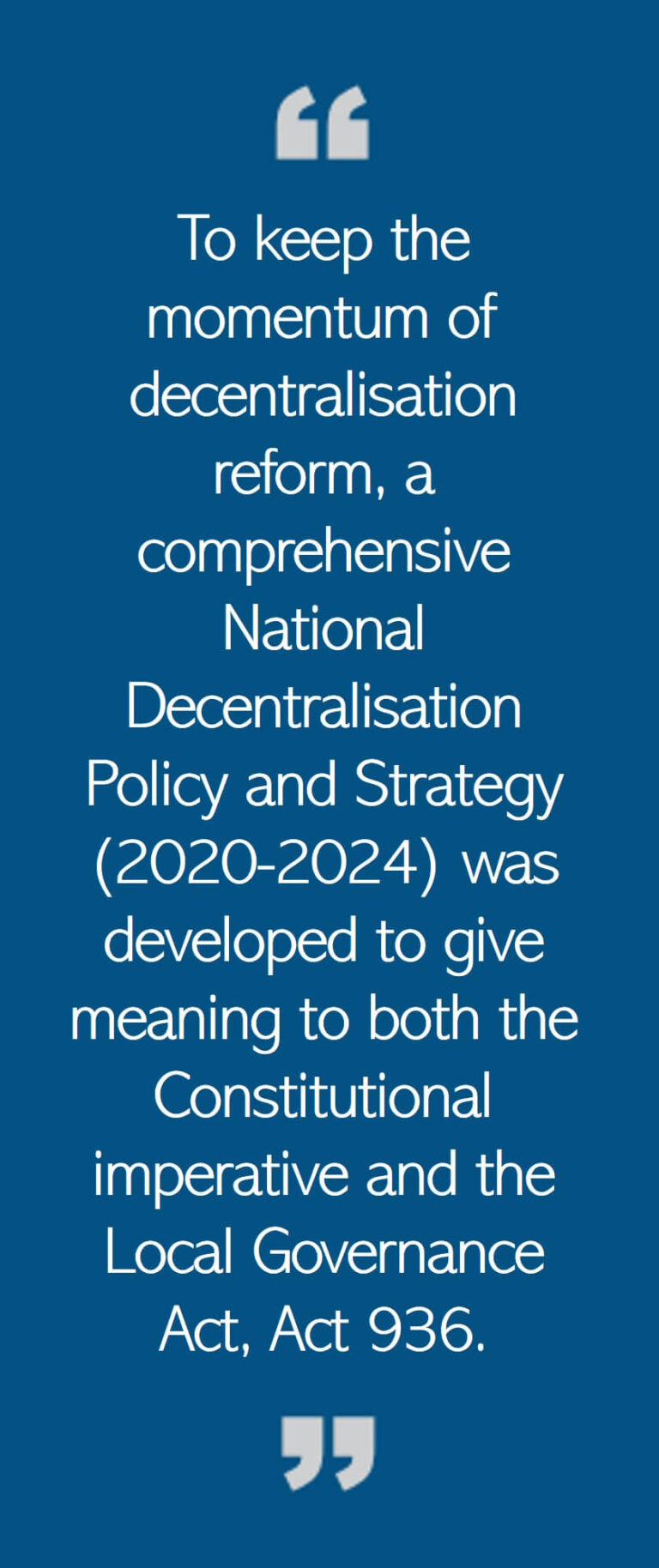Message from the Executive Secretary
"His Excellency the President’s key aspiration is to ensure that we achieve democratic developmental decentralisation within the shortest possible time"
Few would disagree that decentralisation is an alternative development strategy as evidence abound the world over, especially in emerging markets on the ability of decentralisation to bring governance closer to the doorsteps of the people, leading to local ownership of decisions and the decision-making process.
Empirical evidence suggests that decentralisation ensures efficient public services tailored to the needs of citizens as local governments understand the preferences of their publics. It engenders greater citizens engagement in local affairs, improves performance in public education and health sectors and allows for more efficient implementation of government programmes with performance and stewardship-oriented strategies which curtail corruption at the subnational level.
It is against this backdrop that decentralisation and local governance in Ghana is provided for in the Constitution under the Directive Principles of State Policy.

Article 35(6) (d) of the constitution provides that the state should take appropriate measures to “make democracy a reality by decentralising the administrative and financial machinery of government to the Regions and Districts by affording all possible opportunities to the people to participate in decision making at every level of national life and in government”.
This is reinforced by Chapter 20 of the Constitution, which says that “Ghana shall have a system of local government and administration which shall, as far as practicable, be decentralised”. Therefore, decentralisation as an alternative strategy to national development in Ghana is a constitutional imperative, providing a strong basis for District Assemblies to have oversight responsibility for deepening democracy, nurturing local economies for development, and providing the needed basic services through decentralised governance.
To further practicalize this constitutional mandate, the Local Governance Act 2016, Act 936 was enacted. The Act seeks to provide for local governance under the constitution by establishing the local government service, provides for the establishment and administration of the District Assemblies Common Fund, provides for the National Development Planning System to define and regulate planning procedures of the District Assemblies; provides the parameters for financial independence of the Districts, and outlines their mandate to coordinate the development, as well as facilitate, monitor and supervise internal audit activities to ensure financial stewardship.

To keep the momentum of decentralisation reform, a comprehensive National Decentralisation Policy and Strategy (2020-2024) was developed to give meaning to both the Constitutional imperative and the Local Governance Act, Act 936. The policy among other things lays a solid foundation for increased devolution of powers and functional responsibilities to MMDAs which requires greater inter-sectoral and inter-service cooperation and collaboration.
However, it cannot be overemphasised that decentralisation is not an event but a process which achieves results over time. We have been on this journey of decentralisation for over thirty years and it’s time to drive the decentralisation reforms towards the direction that will ensure that we build resilient and empowered local economies because they are the bedrock of a strong national economy. The need for local public service managers to fully exploit the economic potential
of their localities using all available opportunities and approaches to achieve sustainable development, decent jobs and improve service delivery must be vigorously pursued.
His Excellency the President’s key aspiration is to ensure that we achieve democratic developmental decentralisation within the shortest possible time by reinvigorating the national discourse on the election of District Chief Executives and delivering the aspirations of the people to elect their local leaders. A well-engaged electorate is an empowered electorate that will make an informed decision to elect or not to elect their local leaders on a partisan or nonpartisan basis. This conversation and stakeholder engagement will be pursued actively by the IMCCoD.
Referencing empirical data which highlights the fact that in Ghana, “the current institutional framework for administrative decentralisation is at best unclear” as various national level actors in the hierarchical power structure are influenced by their own vested interest to continually undertake actions that are not in the spirit and letter of decentralisation, we are at a point where we need to pursue legal reforms that will facilitate effective ministerial realignment and a well capacitated local government staff with all the tools and logistics, with the right organizational arrangements to be productive for the benefit of citizens.
Further, to achieve the aspirations of decentralisation as enshrined in the Constitution, the IMCCoD is committed to coordinating andsupporting reforms in public financial
management to empower MMDAs to be fiscally sustainable to reduce their over-reliance on the central government. Therefore, the passage of the local government finances bill into law as well as the implementation of the inter-governmental fiscal framework 2020 -2024, the IGF strategy and the rollout of the uniformed platform for property rates remain major and urgent deliverables.
Last but not the least, the IMCCoD is focused on the implementation of the National Framework for Popular Participation with special emphasis on improving women’s participation in Local Governance and the need to enhance participation models through the adoption of digital platforms. In this regard, we intend to develop a Municipal App to enhance participation and service delivery within our local Assemblies. We also intend to embark on an aggressive Public Sensitisation Drive through MMDCEs Community Engagement activities and media engagement.
Undoubtedly, our raison d’etre is to work with key stakeholders to strengthen the IMCCoD as the key national institutional mechanism for the intersectoral policy coordination for decentralisation and the decentralised local government system. This requires all hands on deck to urgently reinforce coordination and monitoring of the reform process to ensure buy-in, keep track of progress and address bottlenecks in time. Whilst the basic elements are in place there are still gaps and issues which need to be urgently addressed to achieve our collective goals.
Therefore, the rebirth of the Decentralist Newsletter is aimed at filling the gap and curing the information asymmetry which has existed between the IMCCoD and its stakeholders and the public. Our vision is to keep you fully informed about developments in the sector by featuring articles and stories from various partners across the decentralisation and local government sector.
Dennis Edward Aboagye
Executive Secretary
IMCC on Decentralization


